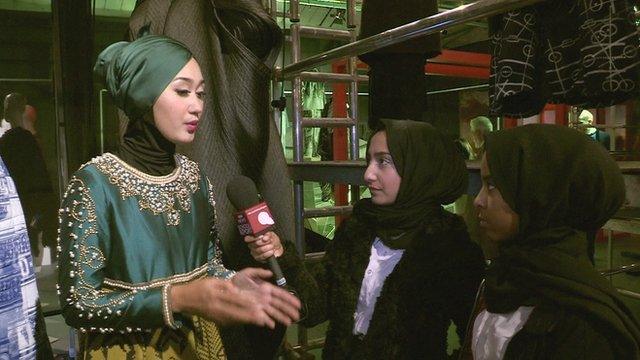Why catwalk Hijabs are upsetting some Muslim women
- Published
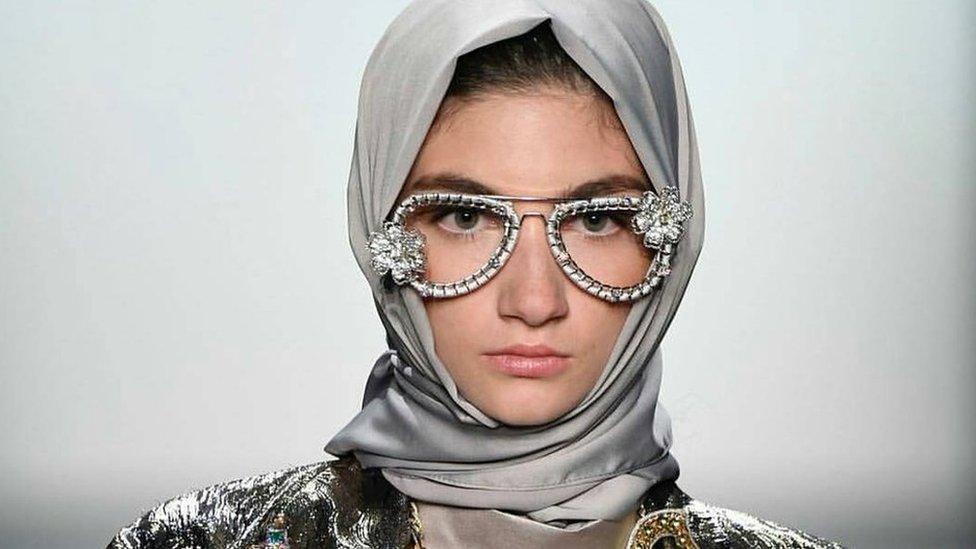
A model wears a hijab as part of the Anniesa Hasibuan collection at New York Fashion Week 2016. Hasibuan is a Muslim designer whose models wear the Islamic headscarf, but now much bigger fashion brands are taking a similar approach.
There's a growing number of fashion brands and multinational companies showcasing women wearing an Islamic headscarf. But, for various reasons, some women from Muslim backgrounds aren't happy with the trend.
Dolce and Gabbana, H&M, Pepsi, Nike: just a few of the big brands putting women wearing a hijab - a traditional Islamic headscarf - front and centre in advertising campaigns.
The hijab has long been a contentious topic of conversation; feminists, religious conservatives, secularists are some of the online communities that have engaged in passionate debate about what it represents. But this time, online and using social media, it's some Muslim women who are questioning the use of such images.
Kendall and Pepsi
Tasbeeh Harwees, a journalist, recently wrote, external in the online magazine Good about a recent viral Pepsi advert starring Kendall Jenner.
The advertisement was controversial because of its alleged trivialisation of street protests - but some Muslim women took issue for a different reason, the casting of a hijab-wearing woman who photographs the rally.
"A multi-billion dollar company was using the image of a Muslim woman to project an image of progressiveness that it may not necessarily live up to," Harwees tells BBC Trending radio.
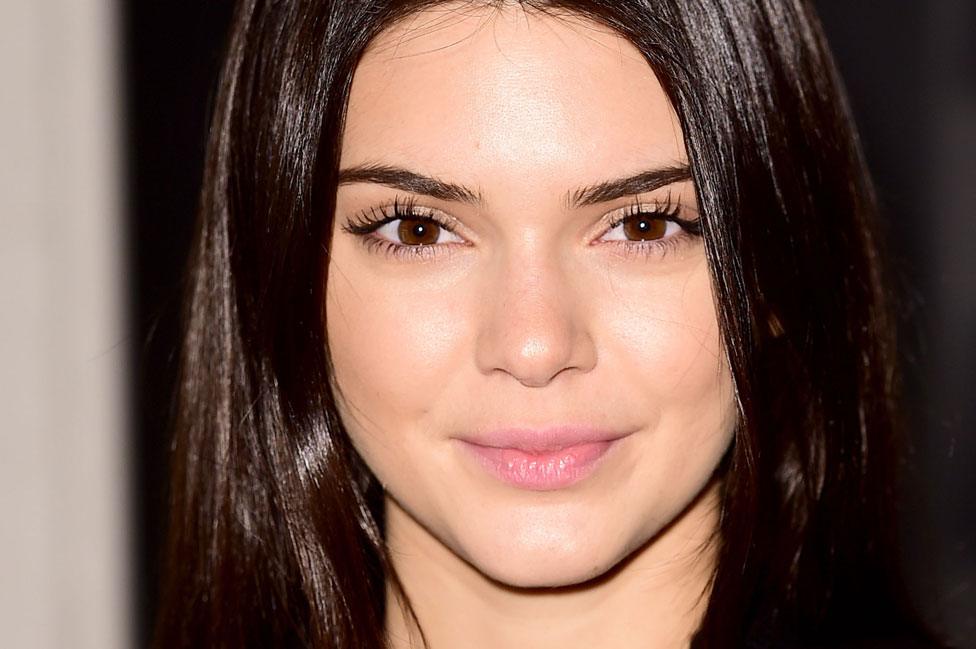
Kendall Jenner was recently derided for taking part in the Pepsi commercial
Brand power
Pepsi certainly isn't the only company highlighting women wearing the hijab. Nike recently announced a newly designed sports hijab which will hit shops in 2018. H&M used a first Muslim model in hijab in an advertisement while numerous brands and labels have launched "Ramadan collections" in the hope of attracting Muslim shoppers during the holy month.
"Images of Muslim women communicate to their consumer bases that these companies are 'progressive' or 'inclusive'," Harwees says. "Given the political climate, it has become socially expedient to align oneself with dissident communities, and for many people, that's what Muslim women have come to represent."
The rise in popularity of so-called hijabi fashion bloggers and make-up tutorials aimed at women who wear the hijab is also a heavily debated subject. They generate millions of views and shares but some women cite increasing pressure to appear fashionable as a reason to stop covering their heads.
They feel something sacred is being undermined by commercialism. Khadija Ahmed is the editor of a new online magazine called Another Lenz, but wrote a personal story of how she wore the hijab for two years, then took the decision to stop wearing it. She told BBC Trending she felt pressured by the images she saw in advertising and on social media.
"I don't feel that the brands are doing us a favour - we don't need the approval of the mainstream companies to approve of our identity," Ahmed says. "It's not doing anything for the Muslim community other than reducing the hijab - which I see as an act of worship - into something as simple as a fashion statement."

More from BBC Trending
Visit the Trending Facebook page, external

Then there are feminists who have quite a different interpretation of the headscarf, particularly in countries where it is mandatory. Masih Alinejad is an Iranian activist and journalist who started the Facebook campaign "My stealthy freedom", showing women in Iran removing their hijabs in defiance of the state.
"I think the media in the West want to normalise the hijab issue - they want to talk about minority Muslims in the West, but they totally forget there are millions of women in Muslim countries that are forced to wear the hijab," Alinejad says.
"If you want to talk about the hijab and introduce it as a sign of feminists or resistance you have to think about those girls and women who are forced to wear it," she says.

Hear more
You can hear more on this story on BBC Trending on the BBC World Service
And for more Trending stories, download our podcast

The bottom line
So with the potential of a growing online backlash, why are brands keen to show off this particular religious garment?
Shelina Janmohamed is vice president of Ogilvy Noor, part of the giant advertising and marketing agency WPP. Ogilvy Noor was established to help market companies to Muslims around the world.
"At this moment in time there is a growing Muslim consumer segment," she says, "and they have lifestyle aspirations about how they want to live and that should be reflected just like any other lifestyle aspiration.
"It's a matter of commerce and the bottom line."
That approach does have some support among female Muslims. Hend Amry has been dubbed "the queen of Muslim Twitter" - and although it's a label she says she is slightly uncomfortable with, she does see an upside in the recent prominence of the hijab online.
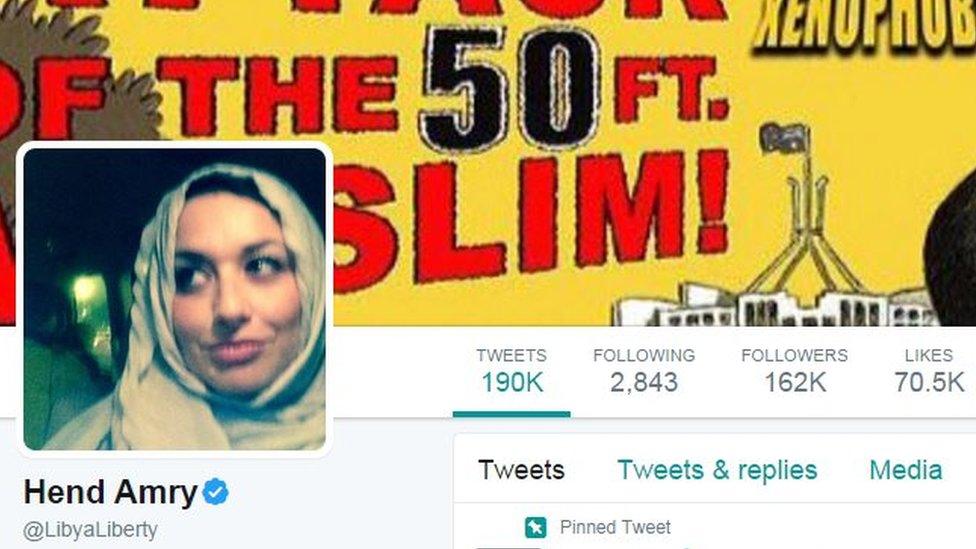
Hend Amry has been dubbed "the queen of Muslim Twitter"
"There are Muslim women in hijab tweeting out these hilarious comebacks or sharing their wisdom or strong personalities," she says. "Just by doing that it's already wiping away stereotypes of the docile, oppressed, silenced Muslim woman, and that's really energising."
"I think there is only one change that needs to be made and that is Muslim women need to tell their own stories. Once that happens the narratives will take care of themselves," she says.
Blog by Anisa Subedar
NEXT STORY: Fears over fake Bieber and Styles accounts
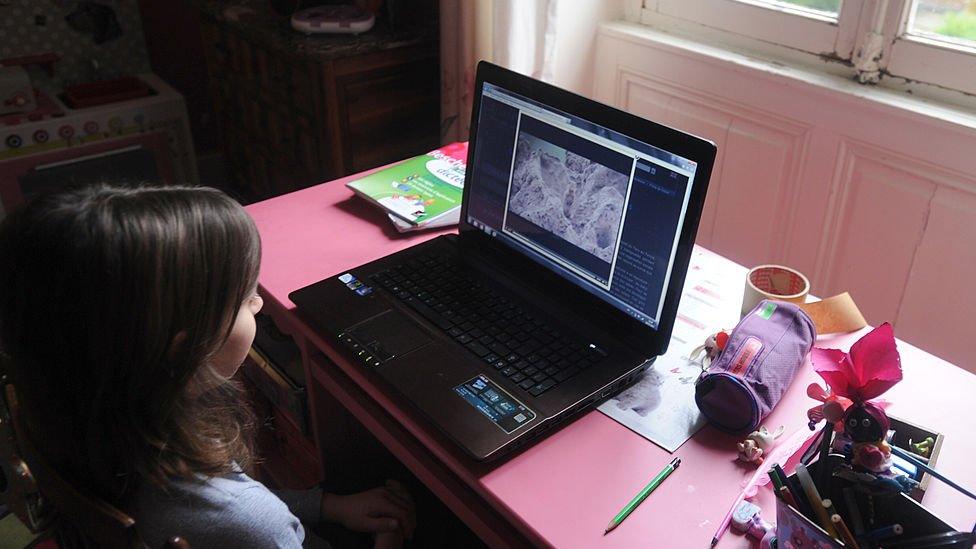
Law enforcement warns Trending about a growing number of social media accounts wrongly purporting to be teen idols like Harry Styles and Justin Bieber.READ MORE
You can follow BBC Trending on Twitter @BBCtrending, external, and find us on Facebook, external. All our stories are at bbc.com/trending.
- Published1 March 2017
